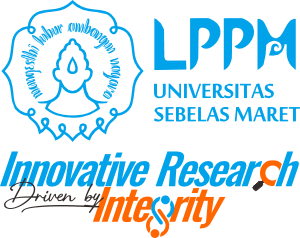Keywords: Sweet sorghum, Sorghum bicolor, bio-ethanol, energy independent
village
By: Samanhudi and Ahmad Yunus
This study aims to assess the response of sweet sorghum to several environmental stresses such as high temperature, drought, salinity, and alumunium, so that got the sweet sorghum varieties suitable to be cultivated in dry land or other marginal land. The study was conducted in the Laboratory of Plant Physiology and Biotechnology, Faculty of Agriculture, Sebelas Maret University, from August to October 2010. Materials and tools used include sorghum seed of Numbu, Kawali, and Sweet varieties, incubators, PEG (polyethylene glycol), Al2(SO4)3, NaCl, petridish, and cotton. This study consisted of several experiments. The experiment I conducted to find the resistance of some varieties of sweet sorghum to high temperatures; experiment II to find the resistance of some varieties of sweet sorghum to drought stress; experiment III to find the resistance of some varieties of sweet sorghum to alumunium stress, and experiment IV to find the resistance of some varieties of sweet sorghum against salinity stress. The design used was Completely Randomized Design (CRD) are arranged in a factorial, which include sweet sorghum varieties factor, temperature, concentration of PEG, concentrations of Al2(SO4)3, and NaCl concentration. The observed variables include germination speed, germination capacity, shoot height, and root length. Data analyzed by Anova followed by Duncan test at 5% level.
The results showed that in: Experiment I, Numbu varieties have sprouted and germination speed is higher than the two other varieties and temperatures up to 32 °C still provides a good growth of sweet sorghum. Experiment II, shows that the Numbu varieties provide speed germination, germination capacity, shoot height, and root length of the second-highest other varieties, and the concentration of PEG up to 20 g/l still provide good growth of sweet sorghum. Experiment III, gives the result that the Numbu varieties have a highest shoot on concentrations of 200 ppm Al2(SO4)3 has been giving stress on canopy growth, while concentrations of 100 ppm Al2(SO4)3 has been giving stress on root growth of sweet sorghum. Experiment IV, show that the Numbu varieties provide germination speed, germination capacity, and high-top canopy, NaCl concentration of 8 g/l has given emphasis to the speed of germination, the concentration of 12 g/l NaCl to give emphasis to the germination, while the stress on the growth of canopy and roots of sweet sorghum have occurred in the concentration of 4 g/l NaCl.

